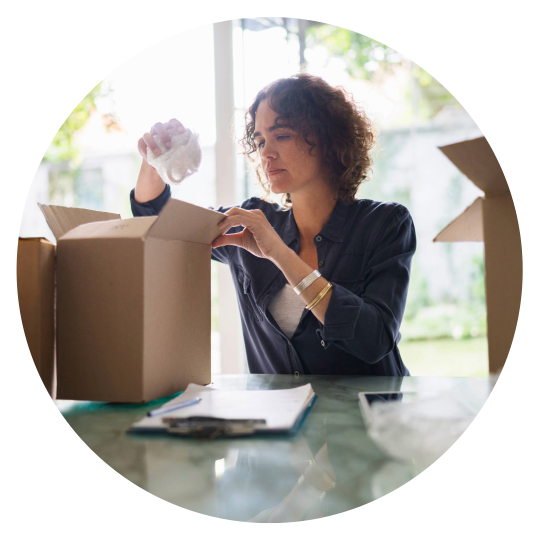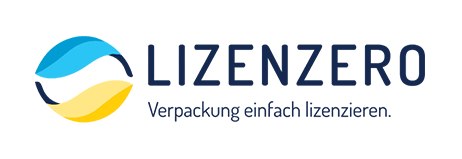All-round carefree: How to take out your packaging licence
Calculate licence fee
Enter your packaging quantities per material in our calculator.
If you do not know your quantities, our calculation tool will help.
Create a Lizenzero account
The next step is to create your customer account.
This will give you access to many great services that will make your life easier (e.g. quantity download for LUCID).
Close licence
Select your payment method and confirm the conclusion of the contract. That's it!



Achieve even more
We now not only recycle your packaging and thus save large amounts of greenhouse gases and primary raw materials, but also renaturalise a piece of moorland under the motto 'We want Moore'.
You can find all the information here.





Would you like more details? This is the step-by-step guide to your packaging licence
To obtain a legally compliant packaging licence, go through the following steps:
- Choose a suitable dual system. How about us, Interzero Recycling Alliance via Lizenzero?
- Calculate your planned annual packaging volumes per material type (fraction). You can either pull this from your ERP system, calculate it "on foot" or simply use our calculation tool.
- Then enter the calculated volumes into the calculator of your dual system; as a standard, the expected licence fee will be displayed directly and transparently.
- Follow the next order steps and conclude a contract for the annual volumes with your dual system.
- Register with the Central Agency Packaging Register (ZSVR) via the LUCID reporting register, stating your company name, the type of company, a contact person, the name of your dual system and the volumes licensed there.
- Activate your LUCID account via the link you received by e-mail after registration. Deposit your registration number with your dual system - you will find it on the dashboard after logging into your LUCID account and will receive it by email.
Your packaging licence can be taken out online, for example with us – Lizenzero, the online shop of the dual system Interzero Recycling Alliance – in just a few steps.
What our customers say
Who has to take out a packaging licence?
As a company, the licensing obligation applies to you if you act as a so-called first distributor. This means that you fill sales packaging with goods for the first time and distribute it to end consumers. Sales packaging includes all product or shipping packaging, including filling materials and packaging materials, that your customers generate as waste at home. Service packaging, such as bread roll bags or pizza boxes, are also considered sales packaging.
As a rule, it is not the manufacturer of the packaging material that is considered the first distributor, but you as the retailer. You use the corresponding packaging material to protect, transport or pass on your goods and thus put it into circulation for the first time. However, as a product manufacturer, you can also be the first distributor if you fill your goods into product packaging and/or outer packaging and then deliver them in packaged form to your distribution partners or points of sale such as shops or directly to your end consumers.
NOTE: If you plan to put sales packaging into circulation, you must licence the volumes and material types of the packaging with a dual system in advance. Packaging licensing is required by law under the VerpackG and is required from the very first packaging, regardless of size, material or weight.
Tip: Transport packaging that is only used for the transport of goods between manufacturers or retailers is an exception.
Variante a) Außer der Lizenzierung Ihrer Verpackungen haben Sie noch nichts weiter unternommen
In diesem Fall fehlen nun noch 2 wichtige Dinge:
1. Die Registrierung bei der Zentralen Stelle:
- durchlaufen Sie den Registrierungsprozess für „Hersteller“ über die Registerdatenbank LUCID Schritt für Schritt
- geben Sie nachträglich die von der Zentralen Stelle vergebene Registrierungsnummer in Ihrem Lizenzero-Kundenkonto ein
2. Die Datenmeldung bei der Zentralen Stelle:
- Geben Sie bei LUCID zusätzlich Ihre bei Lizenzero beteiligten Verpackungsmengen pro Material sowie den Namen Ihres dualen Systems (INTERSEROH Dienstleistungs GmbH) an
Variante b) Sie haben sich bereits bei der Zentralen Stelle Verpackungsregister registriert
Dann fehlt mit der Datenmeldepflicht bei der ZSVR (siehe links) nur noch ein letztes To do:
- Tragen Sie Ihre über Lizenzero beteiligten Verpackungsmengen und den Namen Ihres dualen Systems bei LUCID ein
Checktipp:
Haben Sie Ihre Registrierungsnummer der Zentralen Stelle schon in Ihrem Lizenzero-Kundenkonto hinterlegt?

A licence to protect the environment

What's behind it:
By taking out your packaging licence, you not only fulfil your duties under the German Packaging Act, but also do a good deed for the environment.
The Packaging Act regulates the handling of packaging waste in Germany. One of the aims of the law is to reduce packaging waste in the long term and promote recycling. To implement this, companies that put packaging into circulation that is disposed of as waste by end consumers are held responsible as part of their extended producer responsibility (EPR).
This is how it works:
You assume your extended producer responsibility with regard to your packaging by concluding a licence agreement with a dual system of your choice (packaging licensing or system participation).
In the context of packaging licensing, your dual system charges licence fees, calculated on the basis of the volume and material of your packaging. Your dual system uses these to finance the collection, sorting and recycling of the packaging waste. In addition to system participation, the Packaging Act also requires registration in the LUCID Packaging Register of the Central Agency Packaging Register (ZSVR) and regular reporting of your licence quantities to LUCID.

This is what lies behind the packaging licence:
The legal basis
The legal basis for packaging licensing has existed since the German Packaging Ordinance came into force in 1991. At the time, the ordinance supplemented the Closed Substance Cycle Waste Management Act (KrWG) and was aimed at companies that place sales or secondary packaging on the market. This means that companies have had to licence their packaging since 1991.
The Packaging Ordinance was repeatedly updated until 2017 and was finally replaced by the current Packaging Act (VerpackG) in January 2019.
Good to know: The Packaging Act also introduced the Central Agency Packaging Register (ZSVR) as a supervisory body and the obligation to register centrally with the ZSVR (Section 9 VerpackG).




